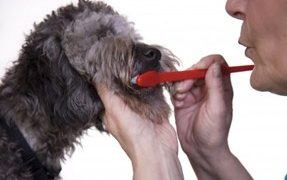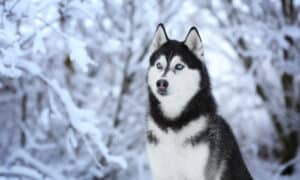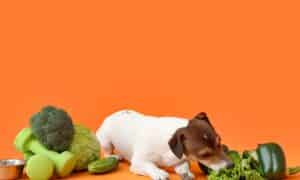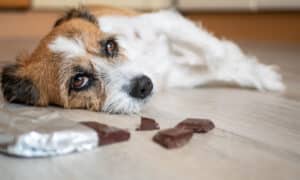“This post contains affiliate links, and I will be compensated if you make a purchase after clicking on my links.”
When we are playing with our dog we all eventually catch a whiff of his or her breath. Whew! Why does the dog have bad breath we wonder. Have they eaten something rotten or is the cause possible a digestive/medical issue? Let’s take a look at the causes why our pooches can have really bad breath.
Why does the dog have bad breath?
Our dog’s mouth has more than one function. He of course eats with his mouth, communicates by barking, growling, whining, and he also carries all sorts of stuff around from his favorite toys to old bones. The health of any dog is closely linked to his mouth and what he puts in it, thus it is vital we pay attention to the question—why does the dog have bad breath?
There can be many causes/sources of the problem. According to an article on PetWave.com, here are just a few:
- Tumors of the oral cavity (especially necrotic malignant masses)
- Canine ulcerative stomatitis (inflammation of the lining of the mouth with weeping sores; may be uremic stomatitis caused by build up of blood urea nitrogen due to kidney disease)
- Non-healing wounds of the tongue and/or surfaces of the mouth…
- Kidney failure (end-stage renal disease; urea and nitrogen build up in the blood stream; uremia)
- Liver failure (end-stage hepatic disease; excess ammonia builds up in circulation; hyperammonemia)
- Immune-mediated disease (systemic lupus erythematosus; drug-induced oral eruptions; others)
The most likely cause is periodontal disease of the teeth and gums. Over time tartar will build up on dog’s teeth due to food becoming stuck between the teeth and around the base at the gum line. This food and bone eventually dissolves and filters down into the gum around the tooth. Bacterial growth occurs and can loosen the teeth as it works its way down into the gums. The dog’s teeth will become loose, and if left unchecked the bacteria often finds its way into our dog’s bloodstream. When this occurs the heart, liver and kidney become susceptible to bacterial infection that now must be treated by your vet.
Signs your dog may have periodontal disease include difficulty eating dry foods, playing with their favorite chew toy causes them to whine, swelling around the eyes and lips, sneezing, drooling, oral bleeding, and consistent pawing at their mouth. If you see these signs you will know why the dog has bad breath, because he or she most likely has an advanced case of periodontal disease and needs to visit your vet as soon as possible.
Prevention of this problem is not difficult. If you are feeding only soft canned dog food switch to dry food. Dry feeding not only helps clean the teeth as the dog eats the food is much less likely to stick to and work its way into areas of the mouth where it can begin the process of becoming a bacterial infection.
Brush your dog’s teeth at least a couple times a week. Use only canine approved toothpaste and a soft bristle brush for this.
These two simple steps will go a long way in preventing potential organ infections and you will no longer wonder why does the dog have bad breath. However, if these steps don’t eliminate the problem fairly quickly, get the dog to your vet to determine what’s causing it. It could be caused by a serious problem.
Does your dog have nasty breath? Comments and tips are welcome below.


















Karen Mitchell
says:"Prevention of this problem is not difficult. If you are feeding only soft canned dog food switch to dry food. Dry feeding not only helps clean the teeth as the dog eats the food is much less likely to stick to and work its way into areas of the mouth where it can begin the process of becoming a bacterial infection."
DRY FOOD DOES NOT CLEAN YOUR DOGS TEETH. IF YOU THINK THIS, THEN YOU DON'T DESERVE TO HAVE A PET, FULL STOP!!!!!
Thank you for some other informative website. Where else may just I am getting that kind of info written in such a perfect manner? I have a undertaking that I am simply now running on, and I’ve been on the look out for such info.
Thank you very much. I learned a lot